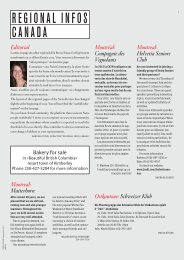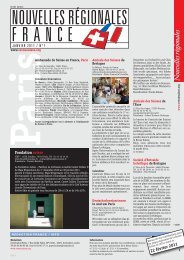Download PDF Swiss Review 1/2013 High Resolution
Download PDF Swiss Review 1/2013 High Resolution
Download PDF Swiss Review 1/2013 High Resolution
Create successful ePaper yourself
Turn your PDF publications into a flip-book with our unique Google optimized e-Paper software.
11<br />
gins are extremely high in some cases. The<br />
prices for medicines, implants and hospital<br />
beds, for example, are very high in Switzerland.<br />
Wheelchairs for which the <strong>Swiss</strong> social<br />
insurance schemes pay several thousand<br />
<strong>Swiss</strong> francs can be purchased online for a<br />
fraction of the price. Health insurance preforms<br />
in recent years. Whether he succeeds<br />
in tackling one of the greatest challenges of<br />
the future – the increase in the number of<br />
The proportion of elderly people in the<br />
population is rising all the time<br />
patients needing care and of the chronically<br />
ill – will prove decisive. The <strong>Swiss</strong> Alzheimer’s<br />
Association estimates that there will<br />
be 220,000 dementia patients by 2030, with<br />
that figure set to reach 300,000 by 2050.<br />
Tens of thousands of German, Polish and<br />
French nursing staff are already working in<br />
Switzerland. They are in short supply in their<br />
home countries, just like the thousands of<br />
foreign doctors working in <strong>Swiss</strong> hospitals<br />
and practices. The OECD and WHO are<br />
calling for a national nursing staff plan.<br />
The two international organisations are<br />
also critical of the lack of healthcare policy<br />
data available in Switzerland. Information<br />
on the effectiveness of treatments is vital<br />
to “knowledge-based” policy, say the<br />
OECD and WHO. They are addressing the<br />
lack of transparency here, a point that is<br />
constantly raised in Switzerland as well.<br />
This lack of transparency means that debates<br />
on healthcare policy are always a bit<br />
of a fumble in the dark. It would be good<br />
to know, and frankly it is very important<br />
that we know, exactly what we are getting<br />
for the large sums of money that we spend<br />
on healthcare.<br />
Seraina Gross is a correspondent for the “Basler<br />
Zeitung“ in French-speaking Switzerland and a<br />
freelance journalist.<br />
<strong>Swiss</strong> <strong>Review</strong> February <strong>2013</strong> / No. 1<br />
Photo: Keystone<br />
beneath human dignity and history shows<br />
where that leads: to a loss of humanity.<br />
But doesn’t Switzerland have to address<br />
the issue of rationing?<br />
Yes, but not in terms of individual patients<br />
or individual patient groups. It is a question<br />
of how we set priorities. We must avoid focussing<br />
on whether or not alcoholics should<br />
be granted liver transplants. We must instead<br />
assess whether the cost-benefit ratio<br />
of the services currently paid for by the<br />
health insurer is right. Does a new cancer<br />
drug launched on the market really justify<br />
the additional costs incurred compared to<br />
existing treatment? Top-quality research is<br />
required to determine this. Switzerland<br />
lacks such cutting-edge research, which is<br />
one of the <strong>Swiss</strong> healthcare system’s greatest<br />
shortcomings.<br />
What do you think about the QALY (Quality<br />
Adjusted Life Years) concept where an amount<br />
is agreed for the cost of an additional year in<br />
good health?<br />
There are currently no real alternatives to<br />
QALY as a measure for assessing the effectiveness<br />
of medical services. However, QALY<br />
should not be used to assess the value of a person.<br />
The question of allocation should not be<br />
delegated to the sickbed. On the other hand,<br />
it is vital that we apply the concept of QALY<br />
to the cost-benefit analysis of services.<br />
Even at the risk that expensive services are<br />
excluded from health insurance cover?<br />
No, if a service is efficient then it can also<br />
be expensive because its cost-benefit ratio<br />
is right. By contrast, the cost-benefit ratio<br />
of a cheap but ineffective service will be<br />
poor.<br />
This means that agreement would be<br />
reached on the services to be covered by<br />
health insurance and if they are included in<br />
the list, then they would be made available<br />
to everyone.<br />
Exactly. I like to compare it to a library.<br />
The decision on whether a book will be<br />
made available to users is made at the time<br />
of purchase. Once the book is on the shelf,<br />
you do not suddenly turn around and tell<br />
someone that they cannot borrow it now.<br />
We must look at the make-up of the healthcare<br />
“library”. I strongly believe that there<br />
are tremendous savings<br />
to be made here.<br />
But would that also<br />
mean assessing who<br />
earns what from the services?<br />
The issue of margins<br />
is also an ethical one.<br />
We know that the mar-<br />
“The lack of cuttingedge<br />
research is one of<br />
the <strong>Swiss</strong> healthcare<br />
system’s greatest shortcomings”<br />
miums have also gone up by more than the<br />
rate of inflation in recent years.<br />
Why aren’t services subjected to close scrutiny?<br />
Because there is no will for transparency<br />
as this would reveal the interests of the various<br />
players. Hardly any other area of politics<br />
is so dominated by strong individual interests<br />
and intense lobbying on the scale<br />
found in healthcare.<br />
Focussing on a more fundamental question,<br />
what is the purpose of a healthcare system?<br />
There is often talk about a healthcare market<br />
in the political debate.<br />
The healthcare system is not simply a market<br />
because a healthcare service is only an<br />
elastic commodity to a limited extent. A<br />
treatment is not like a car where you can decide<br />
for yourself whether<br />
you want to buy one and,<br />
if so, what model. If you<br />
are in an emergency ward<br />
suffering from a bilious<br />
attack, then you are no<br />
longer the one making the<br />
decision; others make it<br />
on your behalf.<br />
Is making money from healthcare unethical?<br />
No, the players involved in healthcare<br />
should, of course, earn money and be remunerated<br />
appropriately. But turning a profit<br />
is not the healthcare system’s raison d’être.<br />
The priority must be to provide care for<br />
sick people.
















